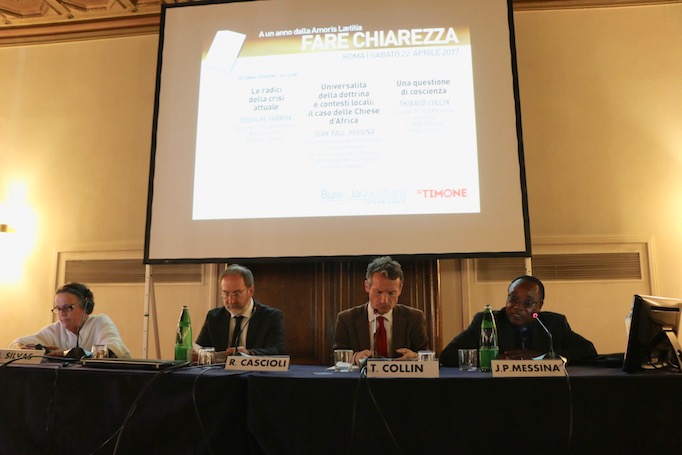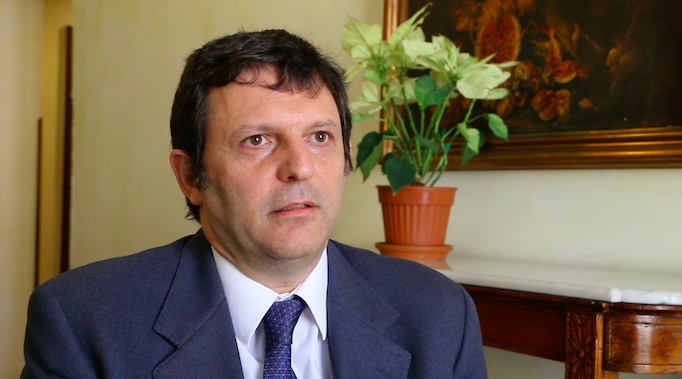Lay Scholars Highlight Problems With ‘Amoris Laetitia’, Crisis in the Church
Speakers at the conference, which took place close to the Vatican, respectfully but firmly criticized contentious parts of the papal document on the family.

At a well-attended Rome conference Saturday, six lay scholars from different parts of the world drew attention to controversial passages of Amoris Laetitia, showing the extent of concern and unease among the laity over the papal document.
To hold such a lay gathering — just yards from the Vatican and critical of a papal text — was unprecedented in the modern history of the Church, and took place after much hand-wringing in the Church following the publication last April of Amoris Laetitia, the Pope’s apostolic exhortation following the 2014 and 2015 Synods on the Family.
The document has prompted divergent and problematic interpretations of key passages, especially over whether or not to allow some divorced and remarried couples living in irregular unions to receive holy Communion. The controversy, some of the speakers said, is symptomatic of a deep crisis in the Church.
Hosted by Riccardo Cascioli, director of La Nuova Bussola Quotidiana, the April 22 meeting at the Hotel Columbus on the Via della Conciliazione was supportive of the four cardinals who last year asked Pope Francis five questions (dubia, or doubts) aimed at clearing up the confusion over differing interpretations of the Holy Father’s apostolic exhortation on the family.
But like the authors of the dubia, Cascioli stressed the meeting, which called for clarification of Amoris Laetitia on the anniversary of its publication, took place “in fidelity to the teachings of the Church and the Pope” and was inspired out of “love for the Church.”
“It’s not a revolt against the Church, nor is it intended to create schism,” Cascioli said, adding that such accusations are a “dishonest way of impeding discussion” among Catholics.
To summarize two of the speeches here: Professor Douglas Farrow, professor of Christian philosophy at McGill University in Montreal, presented the roots and context of the current crisis (see our pre-conference interview with Farrow here).
Crisis of several dimensions
“It is not too much to speak of a crisis in the Church today, a crisis in several dimensions,” Farrow said in the opening of his speech. “There is a crisis of morality. There is a crisis of doctrine. There is a crisis of authority. There is a crisis of unity.”
He explained how today’s society with “few sexual scruples” with a generation “fully absorbed” in the contraceptive mentality and therefore “engaged in an attempt to detach its sexual acts from procreation as far as possible” makes it unsurprising that the sacrament of marriage is under “great pressure” — just as Humanae Vitae predicted.

Alluding to signs of this in the Church, such as ecclesiastics who have recently questioned Christ’s teaching on marriage because no one caught his words on a tape recorder (according to the new superior general of the Jesuits), or had homoerotic murals painted on the walls of their church (as the current president of the Pontifical Academy for Life did), Farrow said:
“The doctrines of the Fathers are despised; apostolic traditions are set at naught; the devices of innovators are in vogue in the churches; now men are rather contrivers of cunning systems than theologians; the wisdom of this world wins the highest prize and has rejected the glory of the cross; shepherds are banished, and in their places are introduced grievous wolves harrying the flock of Christ...”
The Canadian professor, who quoted among others St. Iranaeus and Cardinal Robert Sarah, then spoke about the doctrinal roots of the crisis, and that “perhaps the greatest challenge” facing the Church today is “to lift its eyes from earth to heaven; from ‘discernment of situations’ to discernment of God.” He addressed how scripture has been divided from scripture, scripture from tradition, and how tradition is regarded with suspicion:
“The outright rejection of Pascendi Dominici Gregis [Pope St. Pius X’s encyclical against modernism] marks a turning point of sorts in Catholicism, after which it became at least conceivable that Humanae Vitae and Veritatis Splendor [Pope St. John Paul II’s encyclical on the fundamentals of the Church's moral teaching] should also be rejected, and that we should eventually be presented with a puzzle like Amoris Laetitia, which both is and (in a few spots) isn’t obviously part of the Great Tradition.”
Consequently, he said, the function of the magisterium has been thrown into doubt and the “new voice of authority is that of the conscience, to which revelation, as vouchsafed in scripture and tradition, is merely a guide and not a governor.”
Diabolical root
Farrow concluded with what he called the “diabolical root” of the crisis, and how the devil seeks to divide man from God and people from each other. “He seeks above all to divide the Church,” he said, adding that this is to be expected “if we justify sin by insinuating opposition between the perfections of God; if we set scripture against scripture and tradition against tradition, and conscience against both.”
“The truth about scripture and tradition is that they cohere, and in their coherence they sustain the Church,” he explained. And the “truth about conscience,” he added, “is that it has no jurisdiction whatsoever over the law of God.”

“It is finally a question of allegiance to our Lord, a question of the fear of the Lord,” he said in closing. “Without a renewal of the fear of the Lord, it will not be resolved.”
In his speech, Claudio Pierantoni, a scholar of patristics and professor of medieval philosophy at the Universidad de Chile, in Santiago, discussed two popes, Honorious and Liberius, who fell into error during the first Christian centuries. One was condemned after his death by an ecumenical council; the other corrected himself during his lifetime.
But he pointed out that, whereas those pontificates oversaw “doctrinal deviation” at a time when the respective doctrines were still being determined, the current pontificate is different. The doctrines being debated today are ones “solidly anchored in Tradition”, Pierantoni said, “exhaustively debated in recent decades and clarified in detail by the recent magisterium.”
He then pinpointed four areas where he believes “destruction of the deposit of faith” can be seen in Amoris Laetitia: passages promoting exceptions to the indissolubility of marriage representing a challenge to divine law; the “absurdity” of saying someone might not be in mortal sin because they are not fully aware of it, despite the “much-recommended discernment and accompaniment”; the supposition in the document that the natural law may admit exceptions, confusing it with positive law (Pierantoni used the example of putting alcohol in a car instead of gas: “It’s not through discernment that I’ll find out whether it works,” he said); and lastly the fact that, due to subjectivism, there is the “disappearance of the natural law,” which means that “Christ disappears.”
On the expected fraternal correction of the Pope on Amoris Laetitia, Pierantoni noted that Francis is in a “blind alley” and that if he answers the dubia “in tune” with the Magisterium, then he will have to “backtrack,” but if he doesn’t, he will be “admitting to heresy.”
“He has therefore chosen silence because, humanly, the situation can seem to have no way out,” Pierantoni said. “But meanwhile, the confusion and the ‘de facto’ schism are spreading in the Church.”
Implied heresy
He further said that due to the speed of modern communications, the Church cannot wait 2 to 3 years without the Pope answering or a fraternal correction, arguing that although the Pope has “not formally” made any heretical pronouncements, Amoris Laetitia “implies them.”
“The text is indirect rather than ambiguous,” the Italian-born professor argued. “One can be insulting and say loud and clear someone is a crook, but say it indirectly.” For this reason, he believes ambiguity “may become an excuse,” allowing some bishops and others to say it can be interpreted in an orthodox way. But although that is laudable in itself, he said it is insufficient, because even if one bishop interprets it in the correct way, the rest of the Church would “go downhill.”
“St. Athanasius [who successfully led the fight against the 4th century Arian heresy] didn’t say I’m OK in my diocese and leave it at that,” Pierantoni said.
He concluded by stressing that a fraternal correction “is neither an act of hostility, nor a lack of respect, nor an act of disobedience.” It is “nothing other than a declaration of truth: ‘caritas in veritate’ [charity in truth]. The Pope, even before being pope, is our brother.”
The other speakers were (click on their name to read their full speeches on Sandro Magister’s site): Anna Silvas, Senior Research Fellow of the Australian Academy of the Humanities, University of New England (Australia) who spoke about: “A year since Amoris Laetitia: a word at the right moment”; Jurgen Liminski, journalist, intellectual, director of the Institute for Demography, Welfare and Family (Germany): “The indissolubility of marriage, a good for society” (French); Jean Paul Messina, professor of the History of Christianity and Religious Studies, Theological Faculty of the Catholic University of Central Africa, Yaoundé, Cameroon, (French); “The universality of doctrine and local contexts: the case of the African churches.”; Thibaud Collin. professor of moral and political philosophy Collège Stanislas, Paris, France: “A matter of conscience” (French).
Cascioli closed the conference by stressing “we’re not here for ideological battle” but rather to “fulfill a vocation to holiness” and the need to be “held accountable to our brothers and sisters” for our actions.
“This is real spirit of this conference,” he said. “The path doesn’t end here.”
Photos: Conference panel, Claudio Pierantoni (EP photos)
- Keywords:
- amoris laetitia
- pope francis


















